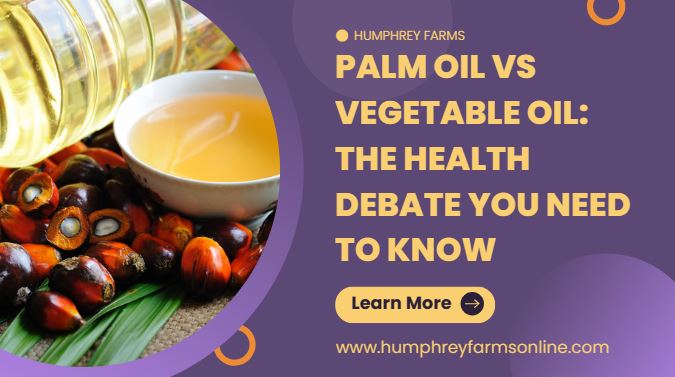
Palm Oil Vs Vegetable Oil: When it comes to cooking oils, palm oil and vegetable oil often steal the spotlight in discussions about health and sustainability.
With varying opinions on their benefits and drawbacks, it’s essential to explore these oils more deeply. Let’s dive into the world of palm oil vs vegetable oil to help you make informed choices for your kitchen!
Also, Read
Are Palm Oil And Coconut Oil The Same?
Are Palm Oil Healthy? Exploring the Benefits and Risks
Understanding Palm Oil
What Is Palm Oil?
Palm oil is derived from the fruit of the oil palm tree, primarily grown in tropical regions. It’s known for its versatility in cooking and is commonly found in many processed foods.
Health Benefits of Palm Oil
- Rich in Nutrients: Palm oil is packed with essential nutrients, including tocotrienols (a form of vitamin E), vitamin A, and vitamin K, all of which support overall health.
- Antioxidant Properties: The antioxidants in palm oil, such as beta-carotene, help protect your body from oxidative stress, potentially reducing the risk of chronic diseases.
- Stable at High Temperatures: With a high smoke point, palm oil is great for frying and sautéing, ensuring it remains stable without breaking down into harmful compounds.
The Saturated Fat Debate
While palm oil contains saturated fats, it’s worth noting that these fats differ from those in trans fats or some other oils.
The specific saturated fat in palm oil, palmitic acid, has a neutral effect on cholesterol levels, making it a heart-healthy option when consumed in moderation.
Exploring Vegetable Oils
What Are Vegetable Oils?
Vegetable oils encompass a broad range of oils derived from various plants, including soy, corn, canola, and sunflower. They’re often used in cooking due to their light flavor and versatility.
Health Benefits of Vegetable Oils
- Heart-Healthy Options: Many vegetable oils are high in unsaturated fats, which can help lower bad cholesterol levels and reduce heart disease risk.
- Variety of Nutrients: Different vegetable oils provide different nutrients, including omega-3 fatty acids, which are beneficial for heart health.
Potential Drawbacks
- Higher in Omega-6 Fatty Acids: Some vegetable oils contain a higher ratio of omega-6 to omega-3 fatty acids, which can contribute to inflammation if consumed excessively.
- Lower Stability: Many vegetable oils have lower smoke points, making them less suitable for high-temperature cooking methods.
Comparing Palm Oil and Vegetable Oil
Nutritional Profile
- Palm Oil: Offers a balanced mix of saturated and unsaturated fats, along with beneficial nutrients like tocotrienols.
- Vegetable Oils: Generally lower in saturated fat but may lack some of the nutrients found in palm oil.
Cooking Stability
- Palm Oil: Highly stable, making it ideal for frying and baking.
- Vegetable Oils: Varies by type; some oils can break down at high temperatures, potentially releasing harmful compounds.
Environmental Considerations
While both palm oil and vegetable oils have environmental impacts, palm oil production has been linked to significant deforestation and habitat loss. However, sustainable palm oil practices are being developed to mitigate these issues.
Making Informed Choices
Considerations for Palm Oil
- Moderation Is Key: Enjoy palm oil as part of a balanced diet to reap its benefits without overdoing it on saturated fats.
- Look for Sustainable Sources: Choose products certified by sustainability organizations to help combat environmental issues.
Considerations for Vegetable Oils
- Balance Your Intake: Incorporate a variety of vegetable oils in moderation to maintain a healthy omega-3 to omega-6 ratio.
- Focus on Quality: Opt for cold-pressed or minimally processed oils for better nutritional value.
Which One Is Better, Palm Oil Or Vegetable Oil?
When it comes to choosing between palm oil and vegetable oil, it really depends on what you’re looking for. Here’s a closer look at both options.
Palm oil has some advantages. Experts from Harvard have pointed out that it’s a better choice than unhealthy trans fats found in some shortenings, and it might even be a better option than butter. This makes it a good alternative if you’re trying to avoid those less healthy fats.
However, when we talk about vegetable oils, particularly those that are liquid at room temperature—like olive oil and canola oil—those are usually considered the top picks for a healthy diet. These oils are often lower in saturated fats and offer beneficial nutrients that support heart health.
So, if you’re deciding which one to use, palm oil can be a good option, especially if you’re cooking at high temperatures. But for everyday use, especially in dressings or for light cooking, going with liquid vegetable oils like olive or canola oil is generally the best way to go.
In short, while palm oil has its place, vegetable oils are often the better choice for overall health. It’s all about balance and making informed choices that fit your dietary needs!
Is Palm Oil Healthy Or Unhealthy?
Palm oil is made from the fruit of the African oil palm tree and has become one of the most widely produced oils globally. You’ll find it in about half of the packaged products at your local supermarket, from food items to cosmetics and toiletries.
So, is palm oil healthy? Let’s break it down!
The Good Side of Palm Oil
Palm oil has some notable advantages. It’s semi-solid at room temperature, which makes it great for spreading, and it has a high smoke point, so it’s excellent for frying without breaking down. Plus, it doesn’t oxidize easily, which helps products stay fresh longer.
Nutrition-wise, while palm oil contains about 50% saturated fat—similar to butter—it’s not as harmful as trans fats. Some studies suggest that palm oil could have health benefits, such as being rich in antioxidants that may support brain and heart health. However, more research is needed to confirm these potential benefits.
The Concerns with Palm Oil
On the flip side, palm oil is high in saturated fats, which can be linked to increased cholesterol levels and heart disease. While it might be healthier than butter or trans fats, it’s still less heart-friendly than oils like olive or canola oil, which are lower in saturated fats.
Additionally, the way palm oil is produced raises environmental and ethical concerns. Large-scale palm oil farming has led to deforestation and habitat loss for wildlife, which contributes to climate change. There are also issues regarding labor practices in some regions.
A Balanced Perspective
In summary, palm oil isn’t outright unhealthy, but it’s essential to use it wisely. If you enjoy cooking with palm oil, that’s fine in moderation, but it’s wise to prioritize oils like olive and canola for daily use. These oils offer more heart-healthy benefits and can help maintain a balanced diet. Just remember to keep an eye on how much saturated fat you’re consuming overall!
Conclusion
In the palm oil vs vegetable oil debate, both oils have their advantages and disadvantages. While palm oil offers unique health benefits and cooking properties, vegetable oils are often favored for their heart-healthy fats. Ultimately, the best choice depends on your dietary needs, cooking preferences, and commitment to sustainability. Always remember, moderation and informed sourcing are crucial for making the healthiest choices for you and the planet!

Leave a Reply
You must be logged in to post a comment.